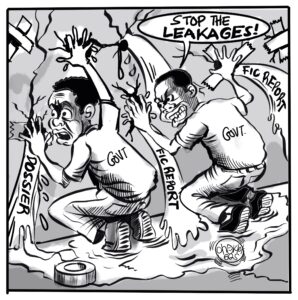Chief government spokesperson Kampamba Mulenga says if the court had decided not to enter a nolle prosequi in the treason case, President Edgar Lungu would have pardoned Hakainde Hichilema in order for the two leaders to dialogue.
And Kampamba, who is also Minister of Information and Broadcasting says police dropped the defamation of the President charges against Saviour Chishimba because the State was “going back to the drawing board” in the spirit of reconciliation.
Meanwhile, Kampamba says Chishimba Kambwili was too big a political figure for him to turn up at a traditional event uninvited.
Speaking on a Diamond TV programme dubbed “Costa”, hosted by Costa Mwansa, Kampamba said dialogue between President Lungu and Hichilema would not have taken place with the UPND leader still in incarceration.
“Obviously we had to wait because this was a matter before the courts of law so there was no way that the dialogue could have been taking place when somebody was still in incarceration. Obviously a ruling had to be made and obviously you are alive to the fact that even if it went the other way, the President under the Constitution has the mandate to actually pardon a prisoner. So even if it went the other way, we would have, still in the spirit of reconciliation, it would have gone otherwise. So this issue of reconciliation either nolle or a convict (sic), it could have taken place because the President has made it very clear here that there was no interference with the court case either from the Baroness Scotland, the former Nigerian President or from his Excellency the President,” Kampamba said, in a rather quarrelsome fashion as she emotionally took question from the host.
“I want to make it very clear that us as government, we are very happy with the outcome of the court ruling especially the nolle as it clearly exculpates the government from the dark cloud of ‘government always interfers with Judiciary’.”
She said it was a must for all citizens, including Hichilema, to recognise President Lungu as Head of State,
“Whether we like it or not, the recognition just has to be there because he is the Head of State and what I want to make very clear is that it is not an issue of forcing anybody, it’s an issue of what the Constitution says. When the President comes to Parliament to address the nation through Parliament, whether you like it or not and whether or not you recognise him, you must be there because it is not the President that will force you to come and sit in Parliament as an opposition but the law.
When Costa asked why the police would arrested a person for expressing their views, charge him for defamation of the president and then release him without taking him to court, Kampamba said the State was in a hurry to dialogue with everyone, hence releasing Chishimba.
“Have you never heard a situation where somebody has a case with you, then later on you change your mind to say ‘okay, well and good, in the spirit of’…especially that we are in the spirit of reconciliation, we said okay fine because we are going back to the drawing board. I am sure these are some of the issues that are going to be talked about. Even us as political leaders, we must handle issues responsibly,” Kampamba said.
Further, Kambamba said Roan member of parliament Chishimba Kambwili was turned away from the Ukusefya Pang’wena traditional ceremony because he was not invited.
“The Mwinelubemba had invited Honourable Kambwili on several occasions to attend the ceremony and he did not attend. So this time around he did not want and that is his Chiefdom and it is his jurisdiction so he has the right to invite or not to invite and that is not an event where government has a part. Even President Lungu himself was just invited and all those Chiefs who came where invited and Honourable Kambwili is not a small figure in the political scenario who will just pop up and turn up for an event,” said Kampamba.

























One Response
Nolle is entered by DPP, not the court.
Anyone who understands the basics of the judicial process knows that a prosecution is brought by the executive branch (through the DPP who is appointed by the executive) and the judiciary adjudicates, the president is head of the executive branch. A decision to enter a nolle is by definition a decision made by the executive to cease, but not drop, a prosecution. Mulenga needs to learn which powers are exercised by which branches of government so as to avoid confusing people, or is it deliberately misleading the public?